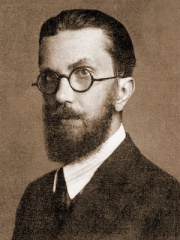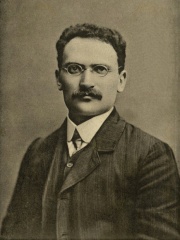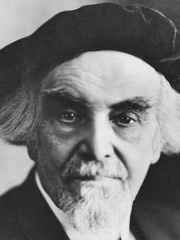
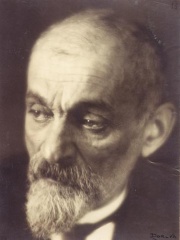

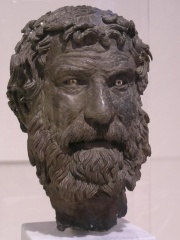

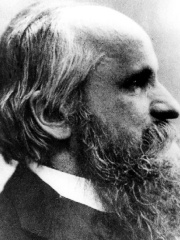
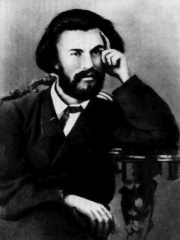
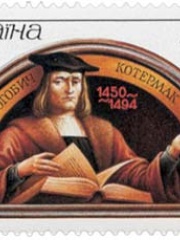
The Most Famous
PHILOSOPHERS from Ukraine
This page contains a list of the greatest Ukrainian Philosophers. The pantheon dataset contains 1,267 Philosophers, 14 of which were born in Ukraine. This makes Ukraine the birth place of the 17th most number of Philosophers behind Austria, and Czechia.
Top 10
The following people are considered by Pantheon to be the top 10 most legendary Ukrainian Philosophers of all time. This list of famous Ukrainian Philosophers is sorted by HPI (Historical Popularity Index), a metric that aggregates information on a biography's online popularity. Visit the rankings page to view the entire list of Ukrainian Philosophers.

1. Nikolai Berdyaev (1874 - 1948)
With an HPI of 72.65, Nikolai Berdyaev is the most famous Ukrainian Philosopher. His biography has been translated into 54 different languages on wikipedia.
Nikolai Alexandrovich Berdyaev (; Russian: Никола́й Алекса́ндрович Бердя́ев; 18 March [O.S. 6 March] 1874 – 24 March 1948) was a Russian philosopher, theologian, and Christian existentialist who emphasized the existential spiritual significance of human freedom and the human person.

2. Lev Shestov (1866 - 1938)
With an HPI of 70.68, Lev Shestov is the 2nd most famous Ukrainian Philosopher. His biography has been translated into 37 different languages.
Lev Isaakovich Shestov (Russian: Лев Исаакович Шестов; 5 February [O.S. 24 January] 1866 – 19 November 1938), born Yeguda Lev Shvartsman (Russian: Иегуда Лейб Шварцман), was a Russian existentialist and religious philosopher. He is best known for his critiques of both philosophical rationalism and positivism. His work advocated a movement beyond reason and metaphysics, arguing that these are incapable of conclusively establishing truth about ultimate problems, including the nature of God or existence. Contemporary scholars have associated his work with the label "anti-philosophy." Shestov wrote extensively on philosophers such as Nietzsche and Kierkegaard, as well as Russian writers such as Dostoyevsky, Tolstoy, and Chekhov. His published books include Apotheosis of Groundlessness (1905) and his magnum opus Athens and Jerusalem (1930–37). After emigrating to France in 1921, he befriended and influenced thinkers such as Edmund Husserl, Benjamin Fondane, Rachel Bespaloff, and Georges Bataille. He lived in Paris until his death in 1938.

3. Anacharsis (700 BC - 600 BC)
With an HPI of 70.65, Anacharsis is the 3rd most famous Ukrainian Philosopher. His biography has been translated into 34 different languages.
Anacharsis (; Ancient Greek: Ἀνάχαρσις, romanized: Anákharsis) was a Scythian prince and philosopher of uncertain historicity who lived in the 6th century BC.

4. Bion of Borysthenes (325 BC - 246 BC)
With an HPI of 65.11, Bion of Borysthenes is the 4th most famous Ukrainian Philosopher. His biography has been translated into 21 different languages.
Bion of Borysthenes (Greek: Βίων Βορυσθενίτης, gen.: Βίωνος; c. 325 – c. 250 BC) was a Greek philosopher. After being sold into slavery, and then released, he moved to Athens, where he studied in almost every school of philosophy. It is, however, for his Cynic-style diatribes that he is chiefly remembered. He satirized the foolishness of people, attacked religion, and eulogized philosophy.
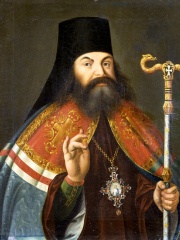
5. Theophan Prokopovich (1681 - 1736)
With an HPI of 63.36, Theophan Prokopovich is the 5th most famous Ukrainian Philosopher. His biography has been translated into 31 different languages.
Theophan or Feofan Prokopovich (Russian: Феофан Прокопович; Ukrainian: Феофан Прокопович, romanized: Feofan Prokopovych; 18 June [O.S. 8 June] 1681 – 19 September [O.S. 8 September] 1736) was a Russian Orthodox bishop, theologian, pietist, writer, poet, mathematician, astronomer, pedagogue and philosopher of Ukrainian origin. He was the rector of the Academia Mohileana in Kiev (1711–1716), the bishop of Pskov (1718–1725), and the archbishop of Novgorod (1725–1736). Prokopovich elaborated upon and implemented Peter the Great's reform of the Russian Orthodox Church; he served as the first vice-president of the Most Holy Synod from 1721, which replaced the office of the patriarch. He was the de facto leader of the synod (and the Russian Orthodox Church) following the death of Stefan Yavorsky in 1722. Prokopovich also wrote many religious verses and some of the most enduring sermons in the Russian language.

6. Zalmoxis (b. 713 BC)
With an HPI of 62.84, Zalmoxis is the 6th most famous Ukrainian Philosopher. His biography has been translated into 21 different languages.
Zalmoxis is a divinity of the Getae and Dacians (a people of the lower Danube), mentioned by Herodotus in his Histories Book IV, 93–96, written before 425 BC. He is said to have been so called from the bear's skin (ζάλμος, zalmos) in which he was clothed as soon as he was born. According to Jordanes' Getica, he was a learned philosopher, before whom two other learned men existed, by the names of Zeuta and Deceneus.

7. Alexius Meinong (1853 - 1920)
With an HPI of 62.54, Alexius Meinong is the 7th most famous Ukrainian Philosopher. His biography has been translated into 24 different languages.
Alexius Meinong von Handschuchsheim (German: [ˈmaɪnɔŋ]; 17 July 1853 – 27 November 1920) was an Austrian philosopher, a realist known for his unique ontology and theory of objects. He also made contributions to philosophy of mind and theory of value.

8. Mykhailo Drahomanov (1841 - 1895)
With an HPI of 62.01, Mykhailo Drahomanov is the 8th most famous Ukrainian Philosopher. His biography has been translated into 24 different languages.
Mykhailo Petrovych Drahomanov (Ukrainian: Михайло Петрович Драгоманов; 18 September 1841 – 2 July 1895) was a Ukrainian intellectual and public figure. As an academic, Drahomanov was an economist, historian, philosopher, and ethnographer, while as a public intellectual he was a political theorist with socialist leanings, perhaps best known as one of the first proponents of Ukrainian autonomism. For Drahomanov, ethnographic studies had a deep influence on his political ideas, and his politics in turn motivated study of particular areas of Ukrainian folk literature.

9. Yuriy Drohobych (1450 - 1494)
With an HPI of 60.96, Yuriy Drohobych is the 9th most famous Ukrainian Philosopher. His biography has been translated into 24 different languages.
Yuriy Drohobych or Yuriy Kotermak (1450 – 4 February 1494) was a Ruthenian philosopher, astronomer, writer, medical doctor, rector of the University of Bologna, and professor of Kraków Academy, and the first publisher of a Church Slavonic printed text. He is the author of Iudicium Pronosticon Anni 1483 Currentis.
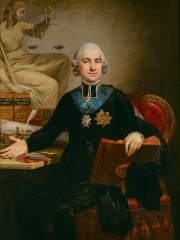
10. Hugo Kołłątaj (1750 - 1812)
With an HPI of 60.58, Hugo Kołłątaj is the 10th most famous Ukrainian Philosopher. His biography has been translated into 24 different languages.
Hugo Stumberg Kołłątaj, also spelled Kołłątay (1 April 1750 – 28 February 1812), was a prominent Polish constitutional reformer and educationalist, and one of the most prominent figures of the Polish Enlightenment. He served as Deputy Chancellor of the Crown between 1791–92. He was a Catholic priest, social and political activist, political thinker, historian, philosopher, and polymath.
People
Pantheon has 14 people classified as Ukrainian philosophers born between 713 BC and 1910. Of these 14, none of them are still alive today. The most famous deceased Ukrainian philosophers include Nikolai Berdyaev, Lev Shestov, and Anacharsis.
Deceased Ukrainian Philosophers
Go to all RankingsNikolai Berdyaev
1874 - 1948
HPI: 72.65
Lev Shestov
1866 - 1938
HPI: 70.68
Anacharsis
700 BC - 600 BC
HPI: 70.65
Bion of Borysthenes
325 BC - 246 BC
HPI: 65.11
Theophan Prokopovich
1681 - 1736
HPI: 63.36
Zalmoxis
713 BC - Present
HPI: 62.84
Alexius Meinong
1853 - 1920
HPI: 62.54
Mykhailo Drahomanov
1841 - 1895
HPI: 62.01
Yuriy Drohobych
1450 - 1494
HPI: 60.96
Hugo Kołłątaj
1750 - 1812
HPI: 60.58
Georges Florovsky
1893 - 1979
HPI: 60.50
Ber Borochov
1881 - 1917
HPI: 60.41
Overlapping Lives
Which Philosophers were alive at the same time? This visualization shows the lifespans of the 9 most globally memorable Philosophers since 1700.

